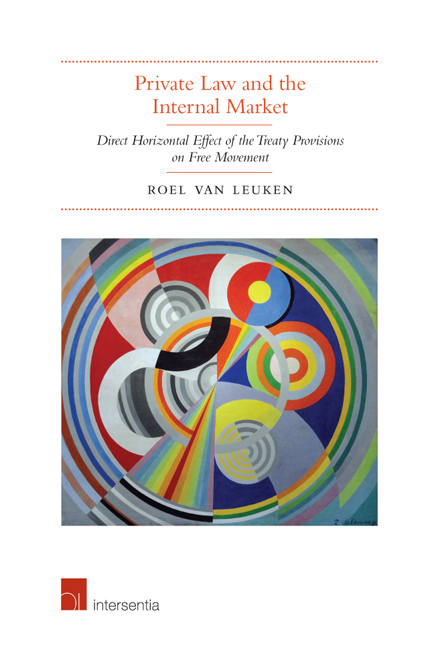 Private Law and the Internal Market
Private Law and the Internal Market Book contents
- Frontmatter
- Preface
- Contents
- Table of Cases
- List of Abbreviations
- Chapter 1 Introduction
- Part I Direct Horizontal Effect: Concept and Application in Competition Law
- Part II Direct Horizontal Effect: Internal Market
- Chapter 4 Fundamental Freedoms: Content of the Prohibitions
- Chapter 5 Case Law on Direct Horizontal Effect of Articles 45, 49 and 56 TFEU
- Chapter 6 Case Law on Direct Horizontal Effect of Articles 34 and 35 TFEU
- Chapter 7 Case Law on Direct Horizontal Effect of Article 63 TFEU
- Part III Justifications
- Bibliography
- Index
Chapter 4 - Fundamental Freedoms: Content of the Prohibitions
from Part II - Direct Horizontal Effect: Internal Market
Published online by Cambridge University Press: 27 September 2018
- Frontmatter
- Preface
- Contents
- Table of Cases
- List of Abbreviations
- Chapter 1 Introduction
- Part I Direct Horizontal Effect: Concept and Application in Competition Law
- Part II Direct Horizontal Effect: Internal Market
- Chapter 4 Fundamental Freedoms: Content of the Prohibitions
- Chapter 5 Case Law on Direct Horizontal Effect of Articles 45, 49 and 56 TFEU
- Chapter 6 Case Law on Direct Horizontal Effect of Articles 34 and 35 TFEU
- Chapter 7 Case Law on Direct Horizontal Effect of Article 63 TFEU
- Part III Justifications
- Bibliography
- Index
Summary
INTRODUCTION
This chapter outlines, in sections 4.2. – 4.4., the substance of the Treaty provisions on free movement of goods (Articles 34 and 35 TFEU), free movement of workers (Article 45 TFEU), freedom of establishment (Article 49 TFEU), freedom to provide and receive services (Article 56 TFEU) and free movement of capital (Article 63 TFEU). Aft er that, in section 4.5. I will briefly discuss whether reliance on one free movement provision can concur with reliance on one or more other ones.
TREATY PROVISIONS ON FREE MOVEMENT OF GOODS
Part Three of the TFEU devotes a separate Title (Title II) to the free movement of goods. Of the prohibitions that are intended to guarantee this freedom, I will discuss two: the prohibition on quantitative restrictions on imports and all measures having equivalent effect (Article 34 TFEU), and the prohibition on quantitative restrictions on exports, and all measures having equivalent effect (Article 35 TFEU).
ARTICLE 34 TFEU: PROHIBITION OF QUANTITATIVE RESTRICTIONS ON IMPORTS AND ALL MEASURES HAVING EQUIVALENT EFFECT
Article 34 TFEU provides succinctly that ‘quantitative restrictions on imports and all measures having equivalent effect shall be prohibited between Member States’. With regard to the term ‘quantitative restrictions on imports’ I will be brief: this ‘covers measures which amount to a total or partial restraint of … imports … or goods in transit’. Examples are a prohibition on imports (‘the most extreme form of restriction’) or a quota which restricts the import of goods according to quantity or value. The term ‘measure having equivalent effect’ is far more important, and will indeed take central stage now.
The Judgments in Dassonville and Cassis de Dijon: Broad Definition
Since the Treaty contains no definition, we must turn to the case law of the Court of Justice for a description of the notion of ‘measure of equivalent effect’, and to the Dassonville judgment in particular. First a brief statement of the facts. A Belgian decree required a certificate of authenticity issued by the country of origin for the import of goods with designation of origin.
- Type
- Chapter
- Information
- Private Law and the Internal MarketDirect Horizontal Effect of the Treaty Provisions on Free Movement, pp. 39 - 62Publisher: IntersentiaPrint publication year: 2017


